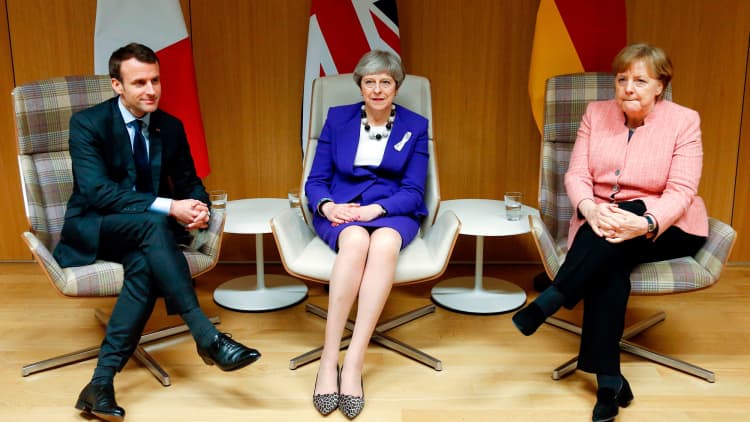European leaders said Thursday they will do their utmost to protect the region's companies from the adverse effects of U.S. sanctions on Iran as they met at a European Union (EU) summit.
President Donald Trump's decision to withdraw from the Iranian nuclear deal will not only see sanctions re-imposed on Tehran, although the extent of these is unknown, but is likely to include extra-territorial "secondary sanctions" too. These could hit European firms doing business in Iran and is a topic high on the agenda for EU leaders meeting in Sofia, Bulgaria, today.
European companies including Total, Maersk and Allianz have signaled that they could exit Iran, fearing they could be hit by U.S. penalties for doing business there.

French President Emmanuel Macron said Thursday that the EU must protect its companies trading with Iran. "International companies with interests in many countries make their own choices, according to their own interests. They should continue to have this freedom," he told reporters as he arrived at the EU-Western Balkans summit.
The U.S. withdrawal from the nuclear deal — which was brokered by Washington alongside U.K., France, Germany, Russia and China in 2015 — has drawn criticism from the rest of its signatories. But their focus has moved from trying to persuade the U.S. to salvage the deal to seeing whether they can maintain it without Trump. Protecting European companies is a key concern.
Arriving at the summit Thursday, Lithuanian President Dalia Grybauskaite said the EU was looking at "technical solutions" to protect its companies, including a "blocking" clause that "could partially protect European companies working in Iran." She said that it was important to remain a part of the deal, however, in order to be able to influence it.
On Tuesday, the EU's head of foreign policy, Federica Mogherini, met with the foreign ministers of France, Germany, Iran and the U.K. The Europeans pledged then to explore "maintaining and deepening economic relations with Iran," including the continued sale of Iran's oil and gas and banking transactions with Tehran. The solutions might not be that simple, however.
There had been talk of using European powers to ban banks in the region from complying with U.S. sanctions, but European Commission Vice President Valdis Dombrovskis said Thursday that any such move would be of "limited effectiveness."
Speaking to the EU parliament, Dombrovskis said "the EU blocking regulation could be of limited effectiveness there, given the international nature of the banking system and especially the exposure of large systemic banks to the U.S. financial system and U.S. dollar transactions," Reuters reported.
Jumping ship
European firms are wary about the prospect of penalties for doing business with Iran, with French oil company Total, Danish shipping group Moller-Maersk and German insurance giant Allianz all announcing they are preparing to exit Iran in order to protect their own interests.
On Thursday, Maersk Chief Executive Soren Skou said he was certain the company was "going to shut down" in Iran. "With the sanctions the Americans are to impose, you can't do business in Iran if you also have business in the U.S., and we have that on a large scale," he told Reuters.
Meanwhile, Total announced Wednesday that it is set to pull-out of a billion dollar gas deal in Iran, called the South Pars 11 (SP11) project. In a statement, Total said it planned to "to unwind all related operations before November 4 unless Total is granted a specific project waiver by the U.S. authorities with the support of the French and European authorities."
American banks are involved in more than 90 percent of Total's financing operations, American shareholders represent more than 30 percent of its shareholding, and U.S. assets represent more than $10 billion of capital employed. Total said it "cannot afford to be exposed to any secondary sanction, which might include the loss of financing in dollars by U.S. banks for its worldwide operations, the loss of its U.S. shareholders or the inability to continue its U.S. operations.
"In these circumstances, Total will not take any further commitment related to the SP11 project."
https://www.total.com/en/media/news/press-releases/us-withdrawal-jcpoa-totals-position-related-south-pars-11-project-iran
European nations tried to persuade Trump to not withdraw from the deal, but earlier in May the president made the decision to renege on what he called a "horrible" agreement. Trump said Iran had flouted the deal, formally known as the Joint Comprehensive Plan of Action (JCPOA), which saw international sanctions on the regime dropped in return for Iran curbing its nuclear program.
Trump said the deal had not stopped Tehran developing its ballistic missile program and disagreed with so-called "sunset clauses" that would allow Iran to re-start at a later date its nuclear program — seen by Iran's critics as a way for the nation to build nuclear weapons.
His secondary sanctions would target companies and banks that trade, invest or financially transact with the Iranian government, companies or individuals. Any that do could entail fines. When announcing the U.S.' withdrawal, Trump gave firms up to six months to wind down their business dealings with Tehran.


